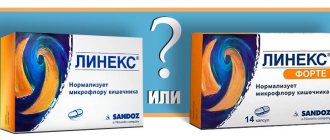Lactobacillus acidophilus (lactobacteria acidophilus)
Lactobacillus acidophilus
(lat.
Lactobacillus acidophilus
) is a type of gram-positive anaerobic non-spore-forming bacteria belonging to the genus Lactobacillus (lat.
Lactobacillus
).
Also called Lactobacillus acidophilus.
Previously called
acidophilus rods
. Lactobacillus acidophilus is the international nonproprietary name (INN) of the drug. According to the pharmacological index, Lactobacillus acidophilus belongs to the group “Medicines that normalize intestinal microflora”. For ATC: a) to the group “Microorganisms producing lactic acid”, code A07FA01 and b) to the group “Lactobacilli”, code G01AX14.
Lactobacillus acidophilus
are normal microflora in the oral cavity, colon and vagina. There are practically no lactobacilli in the stomach and small intestine.
Lactobacillus acidophilus
, as well as
Bifidobacterium bifidum
, stimulate intestinal transit (Lychkova A.E.).
Lactobacillus acidophilus
suppress the growth of
Helicobacter pylori
, however, there is no experience of successful Helicobacter eradication using
Lactobacillus acidophilus
(Melnikova I.Yu.), however, the addition of probiotics containing some strains of
Lactobacillus acidophilus
and/or
Bifidobacterium spp
. to standard anti-Helicobacter therapy in standard doses for one month improves the tolerability of antibiotics, increases the efficiency of
Helicobacter pylori
and compliance (Standards for the diagnosis and treatment of acid-dependent and Helicobacter pylori-associated diseases (fifth Moscow Agreement)).
Previously, all types of lactobacilli found in the vagina and representing the main component of its normal microflora were called Dederlein bacilli, named after the German gynecologist Dederlein (A. Doderlein, 1860-1941). The main function of lactobacilli in the vagina is to maintain an acidic environment and suppress the growth of opportunistic microorganisms. A significant part of Dederlein's rods consists of Lactobacillus acidophilus
(as well as
Lactobacillus casei, Lactobacillus fermentum, Lactobacillus cellobiosum
and others).
Lactobacillus acidophilus in medicines, dietary supplements and lactic acid products
Lactobactria acidophilus is the only active ingredient in medicines
: Acylact, Biobacton dry, Ecofemin.
Lactobacillus acidophilus is included in many dietary supplements. For example, a strain of Lactobacillus acidophilus
LA-5 is used in dietary supplements Bifiform Complex and Normobakt,
Lactobacillus acidophilus
D No. 75 and D No. 76 - in Vitaflor.
Combined medicinal product with the active ingredient lactobacillus acidophilus + kefir fungi:
Acipol.
One of the components of the drug Linex is Lactobacillus acidophilus sp.
L. gasseri .
Germless aqueous substrate of metabolic products of Lactobacillus acidophilus
is part of the antidiarrheal drug Hilak forte.
Acidophilic lactobacilli cause lactic acid fermentation and, due to this quality, are widely used in the manufacture of lactic acid products. They are also included in products to further position them as probiotic. In particular, lactobacilli acidophilus are used in the following brands of probiotic products: Biomax fermented milk products (Russia), Sojasun soy yogurt (France), Muller Vitality yogurt and fermented milk drink (UK), Mountain High yogurt (USA), LG 21 yogurt (Japan), fermented milk and soy drinks Lifeway Kefir (USA).
Lactobacillus acidophilus strain
nv EP 317/402 “Narine”, isolated in 1964 by Professor L.A. Erzinkyan, is the basis of the probiotic Narine (or Narine; available in the form of powder and capsules). Narine powder, in turn, is used to produce the fermented milk product Narine.
Medical literature addressing the use of Lactobacillus acidophilus in probiotics
- Probiotics and prebiotics / World Gastroenterology Organization (WGO). Practical recommendations. 2008.
- Standards for the diagnosis and treatment of acid-dependent and Helicobacter pylori-associated diseases (fifth Moscow Agreement) // XIII Congress of the NOGR. March 12, 2013
- Lazebnik L.B., Rustamov M.N. The use of probiotics in the eradication of HELICOBACTER PYLORI // XII Congress of Scientific. Society of Gastroenterologists of Russia “Classical and Applied Gastroenterology” Abstracts of reports. March 1-2, 2012 M. S. 18-19.
- Melnikova I.Yu. Clinical studies of the therapeutic and preventive effectiveness of the probiotic Vitaflor produced by the State Research Institute of Highly Pure Biological Preparations of the Ministry of Health of the Russian Federation. Report // GOU DPO MAPO. Saint Petersburg. 2004, 37 p.
On the website GastroScan.ru in the “Literature” section there are subsections “Microflora, microbiocenosis, dysbiosis (dysbacteriosis)” and “Probiotics, prebiotics, synbiotics, symbiotics”, containing articles on relevant topics.
Lactobacillus acidophilus in the taxonomy of bacteria
According to modern classification, the species Lactobacillus acidophilus
belongs to the genus
Lactobacillus
, which is included in the family
Lactobacillaceae
, order
Lactobacillales
, class
Bacilli
, phylum
Firmicutes
, <group without rank>
Terrabacteria group , kingdom Bacteria. Back to section
The role of lactic acid bacteria in human health
Lactic acid bacteria is the common name for bacteria of the family Lactobacillaceae, the main property of which is the ability to form lactic acid as the main fermentation product [1]. Lactic acid has a positive effect on human intestinal motility, reduces flatulence, and can also have a stimulating effect on the secretory activity of the salivary glands; in its presence, the absorption of calcium, phosphorus and iron improves [2, 3]. Lactic acid bacteria are not involved in the occurrence of any pathological processes; on the contrary, they have a positive effect on the vital functions of the human body [4]. Most lactic acid bacteria are probiotic strains isolated from the intestinal flora of a healthy person (bifidobacteria and lactobacilli), which remain viable when passing through the gastrointestinal tract and have a beneficial effect on human health, which is confirmed by clinical trials. They are included in medications, food additives, and, more recently, in fermented milk products. Current trends are such that the final forms of products enriched in this way should also have clinically proven positive effects on the human body.
The first researcher to suggest that some bacteria are not at all harmful to humans, but on the contrary, can have a positive effect on health, was the famous Russian scientist Ilya Ilyich Mechnikov. At the very beginning of the 20th century. he conducted research on the possibility of restoring intestinal microflora using lactic acid coli. As a result of serious and painstaking research, the scientist studied the properties of the bacterium, which he called the “Bulgarian bacillus” (in the modern classification - Lactobacillus bulgaricus), and also developed a recipe for a fermented milk drink - the prototype of modern yogurt. I.I. Mechnikov himself, his colleagues and acquaintances for many years regularly consumed this drink, which is also called “Mechnikov’s curdled milk,” and were able to verify its beneficial qualities from their own experience.
Currently, a variety of positive effects of lactic acid probiotic bacteria are known, confirmed by numerous clinical studies. First of all, it should be noted that these bacteria play an important role in maintaining colonization resistance, that is, they have a pronounced antagonistic activity against pathogenic microorganisms, producing various organic acids, hydrogen peroxide, antibiotics and bacteriocins [5]. Some representatives of lactic acid probiotic bacteria (for example, L. acidophilus) produce highly active hydrogen peroxide, due to which they have a pronounced viruscidal effect against the human immunodeficiency virus [6].
Despite the fact that at the beginning of the last century, I. I. Mechnikov suggested that lactic acid bacteria are capable of increasing the human body’s resistance to various diseases, only in recent decades has the theory of the immunomodulatory effect of these microorganisms been proven. It was found that some strains of lactic acid bacteria are capable of exerting an immunostimulating effect, promoting the production of cytokines in the intestine (including interleukins-1, 6, 10, tumor necrosis factor alpha), antibodies, stimulating the synthesis of interferon gamma lymphocytes, as well as increasing the activity of phagocytes and natural killer cells (NK cells) [6–9]. Thus, the ability of probiotics to enhance the human body’s resistance to certain diseases has been proven. Thus, lactic acid probiotic bacteria are effective for the prevention of widespread winter infections caused by various respiratory viruses. There is evidence that consuming L. bulgaricus OLL1073R-1 in yoghurts reduces the risk of contracting colds in older people, since this strain complements the natural activity of NK cells [10]. A study of more than 1,000 adult volunteers showed a reduction in the duration of acute respiratory infections in individuals who consumed 200 ml of a fermented milk probiotic product (Actimel) containing L. casei strain DN-114001 daily for 3 months [11]. The positive effect persisted even a month after the end of treatment. American researchers attempted to determine the effect of consuming lactic acid probiotic bacteria on infectious diseases in children. In the group receiving L. casei DN-114001 (Actimel), the incidence was significantly lower than when using placebo [12]. Similar data were obtained by Russian scientists [13].
The human body constantly has to adapt in response to changes associated with the influence of environmental factors and lifestyle. Aging, stress, intense physical training, living in a metropolis and even cold weather - all this negatively affects the human body. The latter is supported by epidemiological data that the incidence of respiratory diseases and diarrhea increases during the winter months. S. Nagata et al. conducted a study to evaluate the effectiveness of taking fermented milk products containing L. casei Shirota against norovirus gastroenteritis in winter in elderly people (the average age of patients is 84 years). It has been established that continuous intake of a fermented milk product with L. casei Shirota reduces the severity and duration of symptoms of fever caused by norovirus gastroenteritis, and also corrects the imbalance of intestinal microflora characteristic of older people [14].
Taking lactic acid probiotic bacteria is also effective for diarrhea. Thus, in eight randomized, placebo-controlled trials with a total of 988 participants, the effectiveness of foods containing L. rhamnosus GG was studied in acute intestinal infections (AEI). There was a significant reduction in the time of manifestation of clinical symptoms of acute intestinal infections from an average of 3.5 to 2.5 days, compared with the group of patients receiving placebo [15, 16]. In the works of Professor A.V. Gorelov et al. demonstrated the clinical effectiveness of L. casei DN-114001 (Actimel) in the complex treatment of acute intestinal infections in children over 3 years of age - the duration of fever, diarrhea syndrome and hospitalization time in children who used it were significantly shorter compared to children who received placebo [17].
Another area in which the effectiveness of lactic acid probiotic bacteria has been proven is antibiotic-associated diarrhea (AAD), which occurs when the composition and activity of the normal microflora of the human gastrointestinal tract is disrupted. In adults, for the prevention of AAD caused by Clostridium difficile, taking Actimel containing the probiotic strain L. casei DN 114001 showed good effectiveness [18]. In children, lactic acid bacteria taken orally can prevent diarrhea or reduce side effects associated with antibiotics (eg, amoxicillin) [19]. A positive effect of the L. casei strain DN 114001 was also revealed during eradication therapy of H. pylori infection in children [20].
The immunomodulatory properties of lactic acid bacteria can balance the imbalance in immune reactions that cause allergic reactions in children. When children with allergies consumed fermented milk products containing L. gasseri CECT5714 and L. coryniformis CECT5711 for 3 months, a significant decrease in the level of IgE in the blood plasma and a significant increase in CD4+/CD25+ T-regulatory cells, secretory IgA and NK cells were revealed. Thus, the consumption of lactic acid probiotic bacteria can have a beneficial effect on the immune parameters involved in the allergic reaction [21].
Lactic acid probiotic bacteria have a positive effect on serum cholesterol levels—some studies have shown that their consumption reduces total cholesterol and low-density lipoproteins and improves liver function [22, 23].
Finally, normalization of intestinal microflora contributes to the normalization of intestinal passage. Regular administration of Bifidobacterium animalis DN-173 010 (Activia) to patients with irritable bowel syndrome accompanied by constipation has been shown to reduce intestinal transit time, increase the frequency of bowel movements and improve the quality of life of such patients [24–27].
Thus, lactic acid probiotic bacteria can be widely used for the prevention and treatment of patients with various diseases (acute and chronic diseases of the gastrointestinal tract, respiratory tract, to restore intestinal microbiocenosis, etc.). The forms of administration of these microorganisms are varied (fermented milk products, medications, dietary supplements), and when choosing, one must be guided primarily by the fact that the positive effect on the human body must be clinically proven not only for the lactic acid probiotic bacteria themselves, but also for finished products, containing these bacteria.
Literature
- Kvasnikov V.I., Nesterenko O.A. Lactic acid bacteria and ways of their use. M.: Nauka, 1975. 384 p.
- Baranovsky A. Yu., Kondrashina E. A. Dysbacteriosis and intestinal dysbiosis. St. Petersburg, 2000; 209 p.
- Vereshchagina T. G., Safonov A. B., Mikheeva I. G. Current problems of artificial feeding. Pathology of newborns and young children (lectures on pediatrics). M., 2001; 1:64–77.
- Tyurin M.V. Antibiotic resistance and antagonistic activity of lactobacilli. Diss. Ph.D. honey. Sci. M., 1990. 146 p.
- Miettinen M., Vuopio-Varkila J., Varkila K. Production of human tumor necrosis factor-alpha, interleukin-6 and interleukin-10 is induced by lactic acid bacteria // Infect Immun. 1996; 64:5403–5405.
- Klebanoff SJ, Coombs RW Viricidal effect of Lactobacillus acidophilus on human immunodeficiency virus type 1: possible role in heterosexual transmission // J. Exp. Med. 1991; 174(1):289–292.
- Solis-Pereyra B., Aattouri N., Lemonnier D. Role of food in the stimulation of cytokine production // Am. J. Clin. Nutr. 1997; 66:521S–525S.
- Borruel N., Carol M., Casellas F. Increased mucosal tumor necrosis factor alpha production in Crohn's disease can be downregulated ex vivo by probiotic bacteria // Gut. 2002; 51:659–664.
- Gill HS, Rutherfurd KJ, Cross ML Dietary probiotic supplementation enhances natural killer cell activity in the elderly: an investigation of age-related immunological changes // J Clin Immunol. 2001. 21: 264–271.
- Makino S., Ikegami S., Kume A., Horiuchi H., Sasaki H., Orii N. Reducing the risk of infection in the elderly by dietary intake of yoghurt fermented with Lactobacillus delbrueckii ssp. bulgaricus OLL1073R-1 // Br J Nutr. 2010; 104 (7): 998?10?06.
- Guillemard E., Tondu F., Lacoin F., Schrezenmeir J. Consumption of a fermented dairy product containing the probiotic Lactobacillus casei DN-114001 reduces the duration of respiratory infections in the elderly in a randomized controlled trial // Br J Nutr. 2010; 103(1):58–68.
- Merenstein D., Murphy M., Fokar A., Hernandez RK, Park H., Nsouli H., Sanders ME, Davis BA, Niborski V., Tondu F., Shara NM Use of a fermented dairy probiotic drink containing Lactobacillus casei ( DN-114 001) to decrease the rate of illness in children: the DRINK study. A patient-oriented, double-blind, cluster-randomized, placebo-controlled, clinical trial // Eur J Clin Nutr. 2010; 64(7):669–677.
- Gorelov A.V., Usenko D.V. The influence of the probiotic product “Actimel” on the health of children // Issues of modern pediatrics. 2003 (2); 4: 87–90.
- Nagata S., Asahara T., Ohta T., Yamada T., Kondo S., Bian L., Wang C., Yamashiro Y., Nomoto K. Effect of the continuous intake of probiotic-fermented milk containing Lactobacillus casei strain Shirota on fever in a mass outbreak of norovirus gastroenteritis and the faecal microflora in a health service facility for the aged // Br J Nutr. 2011; 106(4):549–556.
- Isolauri E., Juntunen M., Rautanen T. et al. A human Lactobacillus strain (Lactobacillus Casei sp strain GG) promotes recovery from acute diarrhea in children // Pediatrics. 1991; 88:90–97.
- Seep E., Mikelsaar M., Salminen S. Effect of administration of Lactobacillus casei strain GG on the gastrointestinal microbiota of newborns // Microbial Ecol Health Dis. 1993; 6:309–314.
- Gorelov A.V., Usenko D.V. Probiotics: mechanisms of action and effectiveness in infections of the gastrointestinal tract // Epidemiology and infectious diseases. 2006; 4:53–57.
- Hickson M., D'Souza A., Muthu N. et al. Use of probiotic Lactobacillus preparation to prevent diarrhoea associated with antibiotics: randomized double blind placebo controlled trial // BMJ. 2007; 335:80–85.
- Shenderov B. A. Medical microbial ecology and functional nutrition. T. 3. M.: Publishing house. Grant, 1998.
- Sykora J., Malan A., Zahlava J. et al. Gastric emptying of solids in children with H. pylori-positive and H. pylori-negative non-ulcer dyspepsia // J Pediatr Castroenterol Nutr. 2004; 39: 246–252.
- Martinez-Canavate A., Sierra S., Lara-Villoslada F. Romero J., Maldonado J., Boza J., Xaus J., Olivares M. A probiotic dairy product containing L. gasseri CECT5714 and L. coryniformis CECT5711 induces immunological changes in children suffering from allergy // Pediatr Allergy Immunol. 2009; 20(6):592–600.
- Higashikawa F., Noda M., Awaya T., Nomura K., Oku H., Sugiyama M. Improvement of constipation and liver function by plant-derived lactic acid bacteria: a double-blind, randomized trial // Nutrition. 2010; 26 (4): 367–374.
- Ataie-Jafari A., Larijani B., Alavi Majd H., Tahbaz F. Cholesterol-lowering effect of probiotic yogurt in comparison with ordinary yogurt in mildly to moderately hypercholesterolemic subjects // Ann Nutr Metab. 2009; 54(1):22–27.
- Agrawal A., Houghton LA, Morris J., Reilly B., Guyonnet D., Goupil Feuillerat N., Schlumberger A., Jakob S., Whorwell PJ Clinical trial: the effects of a fermented milk product containing Bifidobacterium lactis DN-173 –010 on abdominal distension and gastrointestinal transit in irritable bowel syndrome with constipation // Aliment Pharmacol Ther. 2009; 29 (1): 104–114.
- Guyonnet D., Woodcock A., Stefani B., Trevisan C., Hall C. Fermented milk containing Bifidobacterium lactis DN-173 010 improved self-reported digestive comfort amongst a general population of adults. A randomized, open-label, controlled, pilot study // J Dig Dis. 2009; 10 (1): 61–70.
- Guyonnet D., Schlumberger A., Mhamdi L., Jakob S., Chassany O. Fermented milk containing Bifidobacterium lactis DN-173 010 improves gastrointestinal well-being and digestive symptoms in women reporting minor digestive symptoms: a randomised, double-blind, parallel, controlled study // Br J Nutr. 2009; 102(11):1654–1662.
- Tabbers MM, Chmielewska A., Roseboom MG, Boudet C., Perrin C., Szajewska H., Benninga MA Effect of the consumption of a fermented dairy product containing Bifidobacterium lactis DN-173 010 on constipation in childhood: a multicentre randomized controlled trial // BMC Pediatr. 2009; 18 (9): 22.
S. V. Nikolaeva, Candidate of Medical Sciences
Federal Budgetary Institution Central Research Institute of Epidemiology of Rospotrebnadzor, Moscow
Contact information for authors for correspondence



